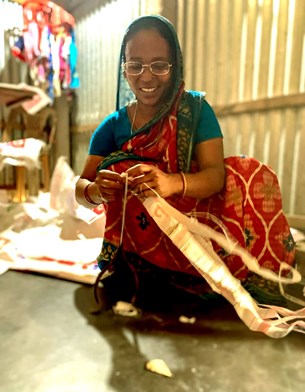VisionSpring’s screening methodology is adopted by the World Health Organisation to increase global
VisionSpring’s screening methodology has been adopted by the World Health Organisation’s (WHO's) new open-access Training in Assistive Products (TAP). TAP equips primary healthcare providers, such as nurses and community health workers, with the skills they need to identify blurry near vision (presbyopia), dispense reading glasses, and refer for other eye conditions.
WHO’s dissemination of this de-medicalised approach to basic eye care represents a major step forward in addressing the global problem of uncorrected blurry vision which affects one billion people.
Of the one billion people who do not have the glasses they need to see clearly, the majority just need a simple pair of reading glasses. To help solve this problem, VisionSpring pioneered an approach to deploy the simplest, cheapest technology (reading glasses), using community health workers in countries with few eye doctors.
Since 2006, its Reading Glasses for Improved Livelihoods (RGIL) program has corrected the vision of two million people. RGIL’s success drove and informed TAP’s Vision Assistive Products module, along with contributions from other NGOs who have replicated the approach.
Dr. Jordan Kassalow, the founder of VisionSpring and co-founder of EYElliance, served as lead technical advisor for vision on the TAP committee and co-authored the reading glasses module.
Dr. Kassalow explained: “Back in 2006, the idea that age-related blurry vision could be treated outside of the doctor’s office by community health workers was controversial. People feared that trusting anyone but accredited medical professionals to perform a basic vision screening would be dangerous.
“Therefore, it is significant that the World Health Organization has created a program adopting our once radical methodology to allow community workers to screen poor vision – it highlights how the status quo is changing.
“It doesn’t get more mainstream than earning the imprimatur of WHO and it turns a small initiative with success in certain markets to a globally accepted methodology that has huge scope to scale.”

Bangladeshi tailor Hasnehena Begum making reusable bags to sell wearing VisionSpring reading glasses purchased from her local community health worker.
